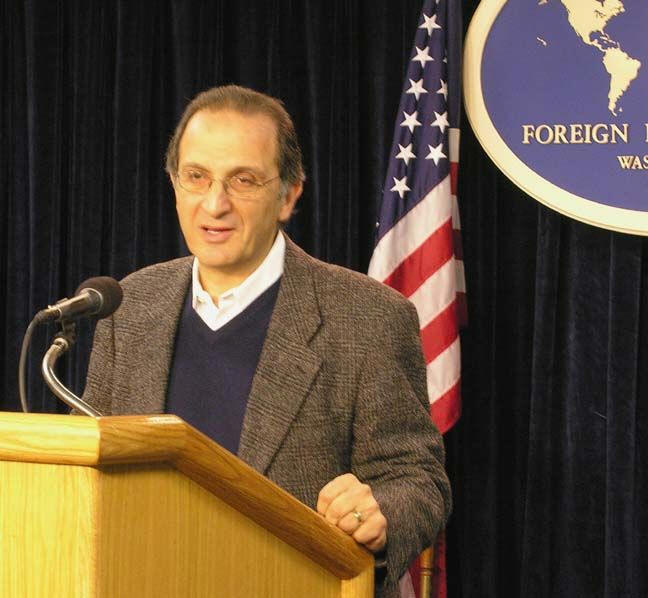www.aljazeerah.info
Opinion Editorials, April 2011
Archives
Mission & Name
Conflict Terminology
Editorials
Gaza Holocaust
Gulf War
Isdood
Islam
News
News Photos
Opinion Editorials
US Foreign Policy (Dr. El-Najjar's Articles)
www.aljazeerah.info
Arabs Give US Neo-Cons a Reality Check
By James Zogby
Al-Jazeerah, CCUN, April 18, 2011
 |
While much of what has come to be known as “the Arab Spring” remains a
work in progress, there can be no doubt that a new dynamic has been
unleashed across the region – one that will have a profound impact as it
continues to play out in the years to come.
What is most important
to recognize is the fact that the developments that have unfolded since
Tunisia have all been generated internally, putting to rest the patronizing
mythology of the neo-conservatives and their ilk, who had long maintained
that change could only come to the Arab World if induced by external (that
is, Western) pressure. This was the view, for example, promulgated by
Bernard Lewis, who once wrote that in the past change had only occurred in
the "stagnant Middle East" when it had been "initiated by past European
rulers". This theme was echoed more recently by Danielle Pletka of the
American Enterprise Institute when she argued that if change were to come to
the contemporary Arab World, "the West must hold open the door" and apply
needed "outside pressure".
For some in the Bush Administration, that
was to be the role of the Iraq war. As it was envisioned (more as an
apocalyptic fantasy, than a war), the U.S.-led invasion would not only
topple the dictator ushering in a new democracy, it would also shock and
shake up the region. Out of the ensuing chaos, they projected that a "new
order" would be born - a view enthusiastically supported by the New York
Times' Tom Friedman who had long described the Arab World as an "ossified
region" and who, therefore, congratulated the Bush Administration for using
the war to blast "a hole in the wall of Arab autocracy". And it was this
same mind-set that caused then Secretary of Defense, Donald Rumsfeld, and
National Security Advisor, Condoleezza Rice to wax poetic about the “passing
of old orders” in the aftermath of the war.
Neo-conservatives similarly projected that Israel's punishing blows against
Gaza and Lebanon would play a transformative role, leading Rice to
cavalierly dismiss the horrible devastation left in the wake of Israel's
2006 onslaught in Lebanon as "the birth pangs of a new Middle East".
These views, of course, were not only profoundly insensitive, they were dead
wrong. Contrary to the Bush Administration's ideologically inspired
projections, the invasion and occupation of Iraq and Israel's war on its
neighbors did not lead to democracy or even to progressive change. Instead,
what was left in the wake of each of these conflicts was death and
destruction, bitterness and suffering, and a deepened sectarian divide,
coupled with a spreading of extremist fervor and intensified regional
tension. Arab populations became roiled, Arab governments that had been
making even modest moves toward change, pulled back and, overall, the region
became more repressive and less free.
The movements that started in
Tunisia and spread to Egypt and beyond, on the other hand, are far more
deserving of the "birth pangs" designation. They have been inspirational -
creating a new pride amongst publics who had long felt deflated and
powerless to make change. They have been contagious - with tactics and
slogans being copied or adapted to local settings, despite each country’s
unique characteristics. And they have been purely Arab and, it bears
repeating, self-generated. There were no would be "Lawrences" or "Rumsfelds"
at work in any of these uprisings fashioning themselves as the shapers of
the Arab's destiny.
To be sure, circumstances differed from place to
place - Egypt is not Tunisia, nor can Yemen or Bahrain or Syria be seen as
cast from the same mold. There were some common characteristics, but what
inspired these revolts in each case were unique to each country.
Nevertheless, it is impossible to ignore the fact that what started in
Tunis, and came to fruition in Egypt, has ignited a new sense of empowerment
and possibility across the Arab World. And as young people have moved to
non-violent protest and been met with violence, it has only hardened their
resolve to demand change.
The story is far from over. Egypt and
Tunisia remain unfinished, while the movements for change in Yemen, Bahrain
and Syria have been frustrated by obstinacy and miscalculation. And Libya,
for its part, has taken a detour - with the role of NATO now fundamentally
altering the course of this revolt, turning it into something quite
different than "the Arab Spring". But even in this unsettled and uncertain
state, there is a new spirit in evidence across the region. Even in
governments where there is no demand for change, or where majorities are
satisfied with their current circumstances, the dynamic of this region-wide
revolt can be felt. Arabs have been inspired and imbued with a new sense of
pride, governments will listen more carefully to citizen needs, and change
will occur.
The path forward will have its obstacles and there
will be setbacks, but the journey will continue. And when the history of
this seminal period is written what will be noted is that the movements that
launched it all and carried it through were started by Arabs, who took steps
by themselves to create their own futures.
|
|
|
|
||
|
||||||


